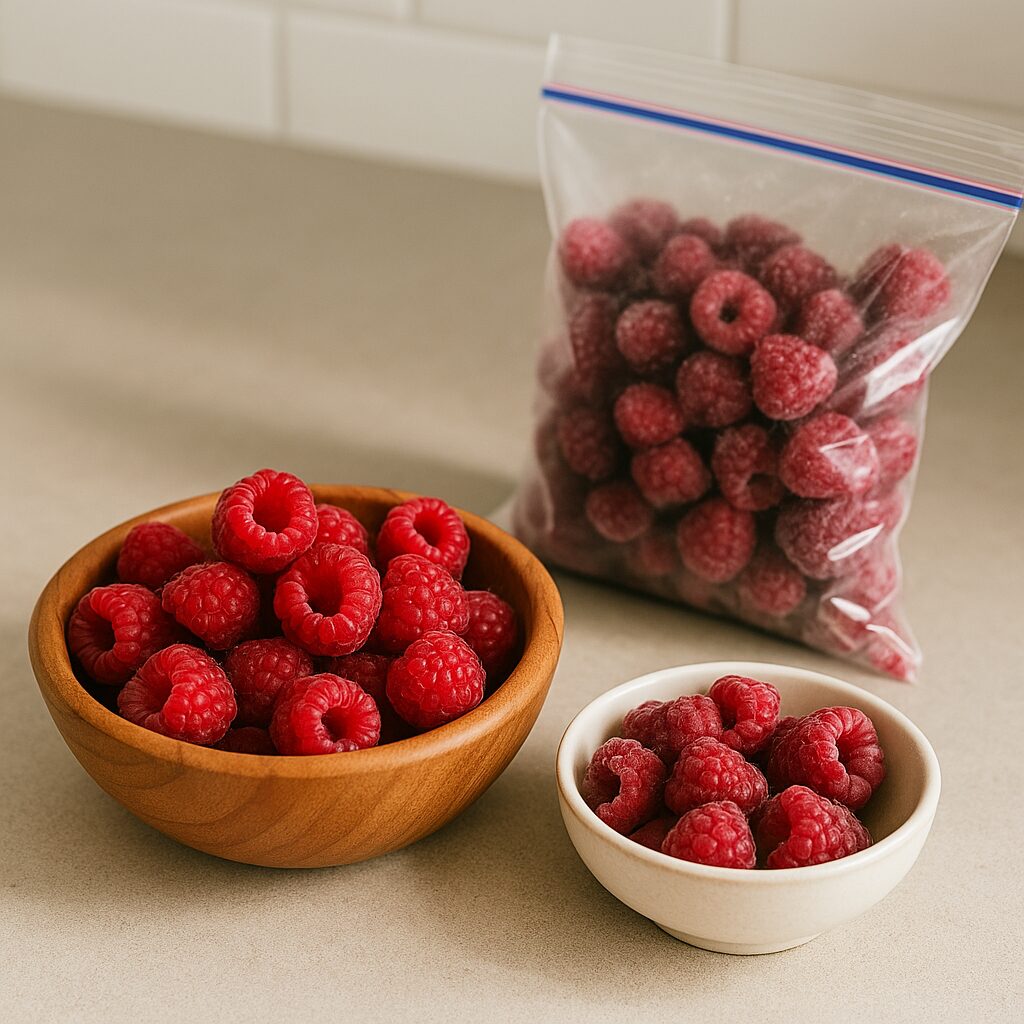Raspberries are well known for their sweet-tart flavor and nutritional richness. They contain vitamin C, fiber, and anthocyanins, making them a valuable addition to a balanced diet. While fresh raspberries offer vibrant taste and texture, frozen raspberries provide convenience and longer storage. Understanding the differences between the two forms may help in choosing the best option for your needs. This article compares fresh and frozen raspberries in terms of nutrition, storage, and culinary applications.

1. Characteristics of Fresh Raspberries
Fresh raspberries are highly appreciated for their delicate texture and refreshing flavor. They are ideal for salads, yogurt toppings, desserts, or simply eating as they are. However, they have a very short shelf life—usually only 2 to 3 days in the refrigerator. Gentle storage in a dry container with paper towels may help reduce moisture and extend freshness slightly.
2. Characteristics of Frozen Raspberries
Frozen raspberries are flash-frozen soon after harvest to help preserve nutrients. They may last for several months in the freezer, making them a practical choice for year-round use. The main drawback is that thawed raspberries often become softer due to water release, but they remain excellent for smoothies, sauces, jams, or baking.
3. Nutritional Differences
Fresh and frozen raspberries are both nutrient-rich. While vitamin C levels may decrease slightly during freezing and thawing, fiber and most antioxidants such as anthocyanins are well preserved. This means that both forms could provide similar health benefits in supporting immunity, heart health, and skin wellness.
4. Storage and Convenience
Fresh raspberries require quick consumption and careful handling. In contrast, frozen raspberries are much easier to store and can be used as needed. They are also more affordable and accessible outside the harvest season, offering flexibility for busy lifestyles.
5. Culinary Applications
Fresh raspberries are perfect for dishes that highlight texture and appearance, such as fruit bowls, cakes, and garnishes. Frozen raspberries, once thawed, may work better in smoothies, baked goods, sauces, or jams where texture is less critical. Using both types strategically could bring more variety to everyday meals.
6. Economic and Seasonal Factors
Fresh raspberries are often more expensive and limited to seasonal availability. Frozen raspberries, on the other hand, are generally affordable and available year-round. This makes frozen raspberries a budget-friendly option for families seeking consistent access to berries.
7. Choosing Between Fresh and Frozen
Both fresh and frozen raspberries have unique advantages. Fresh raspberries may be preferred when presentation and crisp flavor are important. Frozen raspberries may be a better choice for cooking, smoothies, or long-term storage. A balanced approach of using both may provide the best results for nutrition and convenience.
🌿
Raspberries, whether fresh or frozen, can be a valuable part of a balanced diet. Fresh varieties may bring vibrant taste and aesthetics, while frozen options offer storage convenience and year-round availability. Choosing the right form based on purpose could help maximize both enjoyment and health benefits.
References and Further Reading
United States Department of Agriculture (USDA) – Berry Nutrition Data
World Health Organization (WHO) – Fruit and Vegetable Guidelines
National Institutes of Health (NIH) – Antioxidants and Health
※ This article is for general informational purposes only. Nutrient content and personal responses may vary, and professional guidance may be useful for individual dietary planning.